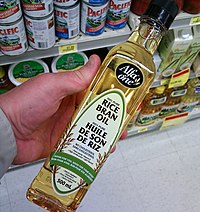
Photo from wikipedia
Abstract The present work involves the investigation of biodiesel characteristics derived from rice bran oil via heterogeneous basic catalytic transesterification path as the rice husk contains about 16–20% of crude… Click to show full abstract
Abstract The present work involves the investigation of biodiesel characteristics derived from rice bran oil via heterogeneous basic catalytic transesterification path as the rice husk contains about 16–20% of crude rice bran oil by its weight. Engine performance and emission characteristics of rice bran oil derived biodiesel blends during fueling a four-stroke, single-cylinder, direct-injection engine at 1500 rpm were investigated. The results indicate that 20% biodiesel blend leads to a lower ignition delay at higher loads which in turn increases the rate of vaporization of the fuel as it has higher cetane umber. This fuel blend has a high in-cylinder peak pressure and heat release rate (HRR) of about 72.1 bar and 70.826 J/°CA respectively, during the pre-mixed combustion phase in rapid combustion due to the higher oxygen content. Even though, it has high viscous nature, it possesses highest brake thermal efficiency (BTE) which adds absolute combustion. The exhaust gas temperature (EGT: 7.8221%) increases with load and the observed values were matched with other biofuels. Moreover, the HCs, COx and NOx emissions decrease as the load increases since the increase in fuel atomization promotes the combustion process and thereby decreases the amount of unburnt biodiesel components. At 100% load, the smoke cloudiness level was decreased by about 21.62%. The rice bran oil and the blended (20, 30 and 40%: B20, B30 and B40) samples were tested for their notable in vitro microbial, antioxidant and nuclease bio activities due to the presence of certain bioactive components in the rice bran derived biodiesel. If the rice bran oil (RBO) is converted effectively into biodiesel, thereby it will not only satisfy 60–70% of our diesel requirement but also facilitate a green environment.